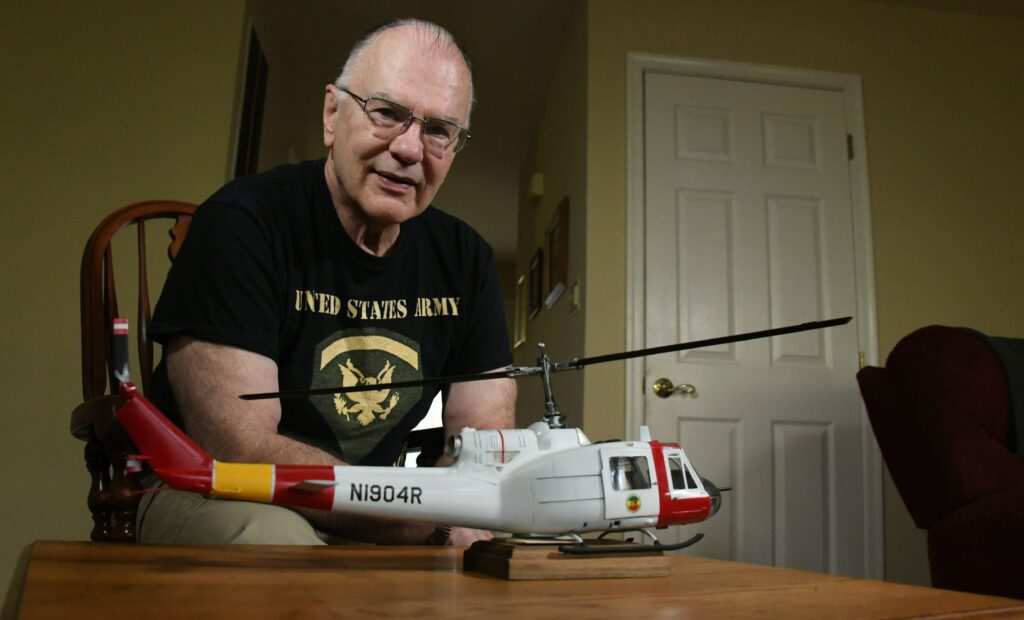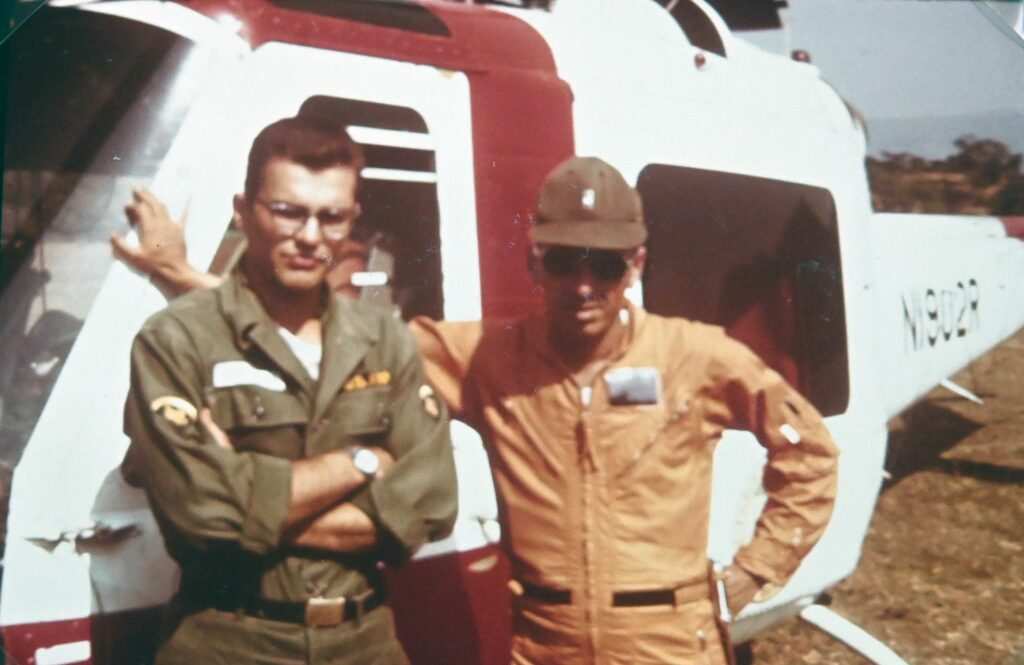The U.S. Army has granted a Maryland military veteran the Prisoner of War medal, bringing an end to a battle he has fought with the Army’s bureaucracy for 18 years and opening the door for other ex-soldiers who have been denied the award under circumstances similar to his.
Ron Dolecki, 76, was part of a U.S. Army team carrying out a classified mapping mission in Ethiopia in 1965 when armed guerrillas ambushed him, his helicopter pilot and a local translator, forced them to march 155 miles across the Sahara desert, and held them captive under harsh conditions for two weeks.

He escaped from the assailants, members of an anti-Ethiopian rebel group known as the Eritrean Liberation Front, and walked 25 miles without arms, food or a map to the Sudanese-Ethiopian border, where he was rescued by friendly forces.
A retired CIA employee who lives in Calvert County, Dolecki first applied for the POW Medal in 2004. The medal is an Armed Forces honor for those who have been “taken prisoner and held captive while engaged in an action against an enemy of the United States” and who meet other criteria.
The U.S. Army Awards and Decorations Branch, the agency that rules on such requests, rejected his application. They did so not because of a dispute over what he went through but over how his captors should be characterized.

Branch officials told Dolecki that the Eritrean Liberation Front, an armed and uniformed group they described as “bandits,” did not qualify as an “armed enemy force,” and that because the U.S. was not in an officially declared war with Eritrea or Ethiopia at the time, he did not qualify.
Dolecki has applied three more times over the years, each time providing more documentation to contest the branch’s accounts. Along the way, his cadre of backers grew to include four U.S. senators, two battalion commanders and a number of military historians.
The Army denied each appeal, citing an evolving series of technicalities. Army officials did not respond to requests for comment.
A spokesman for U.S. Sen. Chris Van Hollen of Maryland confirmed Wednesday that the Army had granted the honor to both Dolecki and Jack Kalmbach, the pilot who was captured with him. Kalmbach died in 2015 at age 87.
Van Hollen, who has been supporting Dolecki’s cause for years, wrote new language into the current National Defense Authorization Act for 2022 that he crafted with the specific aim of making it clear that Dolecki qualified for the award. President Joe Biden signed the act into law in December.
“Finally there’s some measure of justice for Ron Dolecki,” Van Hollen said. “He was on duty with the U.S. military when he was taken prisoner. The Army needs to recognize his service and sacrifice and recognize the hardships he endured as part of that service. This is great news, and it’s long overdue.”
Historians say the Prisoner of War Medal, a military honor authorized by Congress and signed into law by President Ronald Reagan in 1985, was written with the broad intent of recognizing brave and honorable conduct on the part of captive U.S. soldiers. It was meant to recognize qualifying soldiers taken prisoner as far back as April 5, 1917, the day before the U.S. entered World War I.
According to its original version, the medal was to be awarded to anyone taken prisoner or held captive “while engaged in an action against an enemy of the United States; while engaged in military operations involving conflict with an opposing Armed Force; or while serving with friendly forces engaged in armed conflict against an opposing Armed Force in which the United States is not a belligerent party.”
The awarding of medals is invariably a subjective matter, said Joe Balkoski, a Baltimore-based military historian and author, and because veterans by the thousands send in applications for such recognition, officials must develop clear criteria by which to make judgments.
But military bureaucracies skew toward saying no, he said, and like most bureaucracies are loath to admit mistakes, let alone go to great lengths to correct them.
Balkoski wasn’t the only researcher outraged to hear about the branch’s rulings in 2004 and on Dolecki’s appeal four year later.
Another military historian, Joseph Kaufmann, wrote a book on the 64th Topographic Engineer Battalion of the Army Corps of Engineers, Dolecki’s unit and the outfit that carried out the top-secret, mid-1960s operation known as the Ethi-U. S. Mapping Mission.
Kaufmann believes such rulings miss the spirit of the medal.
“These field parties ― often supported by aircraft — crossed deserts, mountains, and jungles, operating in areas that included everything from deadly snakes to lions and an array of diseases,” he told The Baltimore Sun in 2020, adding that the then-20-year-old Dolecki faced grave perils and handled himself courageously while crossing the desert.
“He had absolutely nothing with him, including nothing to protect himself with,” Kauffman said. ”Unless you have been in the field and surrounded by hyenas, and hear their whooping noise, you don’t know how dangerous that can be.”
Another historian had taken note of similar cases. Dwight S. Mears was teaching at the U.S. Military Academy in 2010 when he applied for the POW Medal on behalf of a group of Army Air Force pilots who had been taken captive and tortured at an internment camp in supposedly neutral Switzerland during World War II. (The group included his late grandfather.)
Rebuffed at first on similarly technical grounds, Mears, an attorney, pressed the Armed Forces to make criteria for the medal less legalistic, a campaign that ultimately led to a 2013 amendment to Title 10 of the United States Code.
The change allowed the medal to be given to those captured under conditions that are “comparable” to the ones “under which persons have generally been held captive by enemy armed forces.”
The pilots were recognized with the POW medal that year, and Mears said he believed the Armed Forces were long since applying the new criteria until he came across the article about Dolecki in The Baltimore Sun in November 2020.
Seven years after the defining language was changed, it seemed, the awards branch still was using outmoded, and therefore unlawful, criteria for the medal. Mears got in touch with Dolecki.
“I offered to help him pro bono,” the historian said. “I thought he deserved far better treatment from the Army, and I suspect there are many out there like him who were wrongly rejected ― possibly hundreds — due to these policy errors.”
For his part, Dolecki sent military photographs, declassified State Department cables and Army after-action reports from 1965 that he believes contradicted the Army’s arguments against his medal.
He has also pointed out that crew members of the U.S. Navy ship the USS Pueblo who were taken prisoner by North Korea in 1968, and U.S. embassy staff taken hostage in Iran in 1979, went on to be awarded the POW medal, and the U.S. was at war with neither country.
When they wrote back, he said, they simply reiterated earlier objections.
“If they said something rational, if they gave me real and true reasons, I’d have said ‘I see your point’ and simply gone away,” he said. “But for whatever reason, they didn’t, and it started making me angry. It just inspired me to keep pushing.”
In December 2020, Van Hollen spoke about his constituent on the Senate floor, arguing that the Army continued to incorrectly apply the previous standard to his case.
Van Hollen then wrote language for the military funding bill aimed at clarifying that Dolecki qualifies. It became part of the current National Defense Authorization Act.
Dolecki’s case eventually made its way to the desk of Army Secretary Christine Wormuth, who has authority to award the medal.
The Army had not contacted Dolecki about the matter as of Wednesday night, but Army officials did contact Van Hollen’s staff by email to relay the news, which Van Hollen’s office shared with the veteran.
The Army also mailed the medal to the senator’s office in Rockville, and an Army official let Van Hollen’s staff know that if Dolecki wished to have a ceremony marking the occasion, the Army would provide one.
Dolecki has told the staff he indeed would enjoy such an occasion, and he hopes they’ll be able to set it up with the military before too long.
“As far as the medal goes, it has been a long, long struggle to obtain it,” he said. “After all this time, I’ll certainly treasure it all the more.”
___
© 2022 Baltimore Sun Distributed by Tribune Content Agency, LLC



